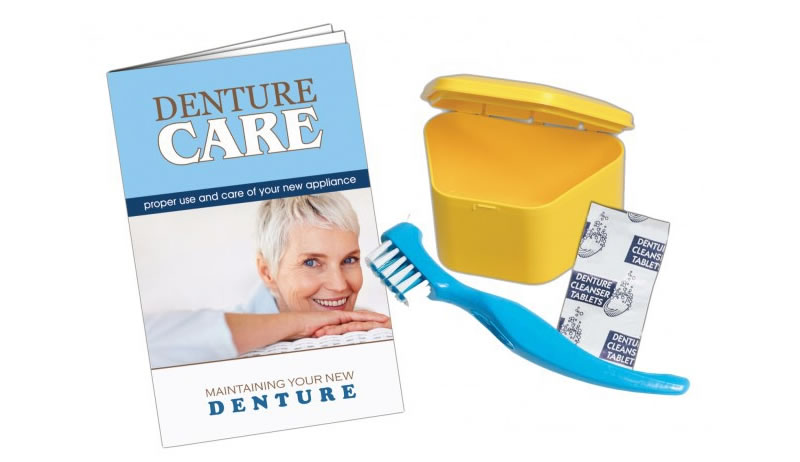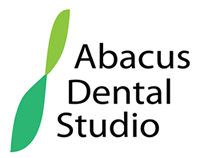
Denture Care Tips
Looking after your dentures is a very important task, since neglect can lead to permanent damage, as well as more frequent replacements and fixes that can become expensive. Follow these tips for how to maintain dentures between visits to the denture care clinic:
- Clean Dentures Consistently. You should clean dentures the same as you would natural teeth – that is, after every meal, except the dentures are removed during this process. This includes rinsing them regularly and immersing them in a cleaning solution every night.
- Be Mindful of Your Diet. Avoid hard or tough foods like walnuts and steak when possible. These foods cause extra wear on your dentures and your gums, which can change how they fit together. Consuming softer foods extends the life of your dentures considerably.
- Have Your Dentures Checked. Even the most well-kept set of dentures will accumulate wear over time. Be sure to enlist the help of a dental professional to assess the quality of your dentures, so you can proactively repair any damage before the dentures break.
Frequently asked questions about looking after dentures
Looking after your dentures is a very important task as they aren’t a cheap item and should be cared for to avoid any temporary or permanent damage. We have received and researched some of the most commonly asked questions about dentures and answered them so that you are fully informed. If there are any questions that you have that aren’t answered below, please feel free to contact our dental practice and get a response ASAP.
How long should I wear dentures for?
For the first few days after being fitted with dentures, you may be advised to wear them constantly. Once your mouth gets used to wearing them, you should remove dentures before you go to bed. This will allow your gums to rest and prevent any fungal infections from developing.
How long will dentures last?
Well cared-for dentures should last several years but they may need to be relined or re-made after normal wear or after any changes in the shape of your mouth as your gums or bone shrink. Poorly fitting dentures can lead to several problems, including discomfort, bad breath, mouth sores and infections.
Will dentures affect how and what I can eat?
Once you first start wearing dentures, you may want to get used to eating with small pieces of soft foods, while avoiding any particularly hard or sticky food. Once you are more familiar with dentures, you should be able to return to a normal, healthy diet.
Will my mouth require special care?
Even if you have full dentures, you should still take good care of your mouth. Brush your gums, tongue and roof of your mouth twice a day with toothpaste and a soft toothbrush. If you have partial dentures, your natural teeth should be cleaned twice daily to prevent tooth decay, gum disease and any future loss of teeth.
What is the best way to care for dentures?
Dentures need to be cleaned as dutifully as natural teeth and are just as susceptible to plaque and trapped food deposits. At least every morning and night you should brush them with paste or soap and water before soaking. Then, they will need to be soaked in a denture cleaning solution. Particular care needs to be taken to remove any traces of denture fixative.
Finally, your dentures need to be brushed as you would your own teeth, with denture cream and a small-headed toothbrush. If your dentures have a plaque build-up or stains, your dentist or hygienist can clean them for you.
If you remove your dentures overnight, store them in a small amount of water to stop them warping.
Remember that dentures can be quite delicate and may chip, crack or break if dropped, so take extra care when cleaning them. Do not try to adjust dentures as you may damage them beyond repair.
Are denture tablets good for cleaning dentures?
Yes, denture tablets are good for cleaning dentures. They require constant maintenance to keep them looking and feeling clean. Without cleaning, they can collect bacteria and other food particles from food, saliva and other sources. The tablet cleans the dentures by scrubbing them clean, removing any mould or bacteria that has assembled over time.
When should dentures be cleaned?
Most dentures should be cleaned every day. Professionals recommend that you remove the dentures and soak them in warm water with a denture cleaning tablet after every meal. It is also recommended that you also brush your teeth and gums comprehensively whilst they are not in your mouth. If you wear your dentures at night, be sure to brush them before you go to sleep too.
Are denture tablets toxic?
Denture tablets have chemicals in them which can be bad for you if ingested. What you must do when using denture tablets is to properly clean and wash the dentures before you put them in your mouth.
Can cleaning your dentures help stop bad breath?
Yes, cleaning your dentures with a brush or denture cleaning tablets can help stop bad breath.
How do I stop food from getting under my dentures?
A common problem with dentures is food getting stuck under the denture and causing irritation. Fortunately, there are a few ways to prevent this from happening.
The first thing to do is make sure your dentures fit properly. If your dentures don’t fit correctly, they’ll be more likely to shift around in your mouth and get stuck on food. The best way to check if your dentures fit correctly is to go to your local dental practice and get their help.
Another tip for preventing food from getting trapped under your denture is to avoid foods that stick together when chewed (such as peanut butter or bread), which can trap food under your gums and cause irritation. Instead, opt for softer foods like yogurt or pudding—they’re easier to chew and swallow!
Problems with poorly fitting dentures
If your gums shrink and you do not have your dentures relines or remade, your lower jaw may become out of line with the upper leading to the face muscles virtually collapsing which gives the appearance of premature ageing by causing old and wrinkled features.
Badly fitting dentures can also cause:
- A dull pain in or about the ears
- A clicking or snapping noise when chewing
- Headaches
- Cracked or continually sore corners of the mouth
Contact Us for More Information About Dentures
At Abacus Dental Studio, we consider ourselves your partner in taking care of dentures, whether it’s minor adjustments or complete replacements. Browse our other services on our website, or you can contact us if you have any questions or would like to set up a consultation.
